- Home
- Christie Ridgway
An Offer He Can't Refuse Page 31
An Offer He Can't Refuse Read online
Page 31
Perhaps she was finally, truly, growing up.
Thirty-seven
“The Best is Yet to Come”
Frank Sinatra
It Might as Well Be Swing (1964)
They were in a collective state of shock, Téa decided, as they followed her grandfather’s order and returned to the party. It was the only explanation for why they stayed silent and obedient.
Her father was really dead.
An accidental death, kept secret by his best friend for the last sixteen years.
It was going to take a while to process that.
But until then…hey, it was time to pa-a-arty!
Johnny disappeared somewhere between the lagoon and the tents. She couldn’t imagine what he was feeling right now, though she hoped he was as numb as she.
Her family had murdered his father for no reason. Because of what she knew was in the Loanshark book, the timing had always made her suspect about Giovanni Martelli’s involvement. Of course, that was before she’d known about his son.
That his son had been close by at the time of the hit.
That she was in love with his son.
Her mother took a place at an empty table near the dance floor and Téa and her sisters followed like automatons. Cosimo linked up with a couple of his ubiquitous lieutenants—Nino and another man she didn’t recognize—and proceeded toward the bar.
She could really go for a zombie mai tai herself right now, Téa thought. She wanted to nurse this numb feeling for as long as possible.
But there was only time for the wish, as the bandleader suddenly signaled for attention with a crash of cymbals. Then came the familiar tune of “Happy Birthday.” Cosimo strode back out of the tent as the dance floor cleared and the three hundred or so partygoers sang along. He smiled and nodded as if he hadn’t a care in the world, then walked to the bandleader and murmured something in his ear.
The musicians segued into a new song, “My Way,” as the bandleader leaned into the microphone. “Ladies and gentlemen, tonight’s guest of honor will lead off the next dance with his eldest granddaughter and the desert’s rising star of interior design…Téa Caruso.”
The crowd applauded as Téa’s grandfather approached her. The desert’s rising star of interior design didn’t know what to do.
Cosimo gave her a small bow, then held his hand out for hers.
She swallowed.
“Per favore, cara,” he said, his hand still extended.
She didn’t want to talk with him, let alone dance with him. But even if she could find the energy to stamp her feet and scream at the top of her lungs, she couldn’t make a scene in front of all these people. Old habits died hard. Old bargains were impossible to forget.
And there was information she needed from him.
So she put her hand in his. It was warm and dry. The skin felt thin, fragile even.
Cosimo, fragile? The notion sent an odd sympathy through her. But then her sandal strap caught in the hem of her long dress, and his grip tightened. His steely hold steadied her. No, Cosimo—nickname the Cudgel—would never be fragile.
On the dance floor, he took her in a loose embrace. With her high heels they were almost eye-to-eye. “Desert’s rising star of design, eh?” he said.
“Don’t try that on me. You told the man what to say.”
Cosimo sighed. “You were always so smart.”
In silence, he led her into a stately fox trot. They had danced together when she was little at other birthdays, weddings, holidays. Always patient, always willing to slow down for a little girl’s short legs. While her father would grow restless at such a pace and end up snatching her off her feet and dancing her around the room like a rag doll, Cosimo would bend himself to accommodate her size.
Téa used to think of her father as a dazzling comet and her grandfather as the calm and quiet moon. But, of course, even the moon or the il capo di tutti cappi—the boss of bosses of the California Mafia—didn’t remain in the sky forever.
She looked up at the twinkling canopy of fairy lights. Their brilliance caught in the sequined dresses of the women ringing the dance floor, causing them to flash like a thousand tiny cameras. They were surrounded by hundreds of gazes too, and Téa could feel their weight and the questions behind them.
Would the old man really retire?
Who would he name to take his place?
And who would battle to take that position away from the new leader?
My family, Téa thought, with a wry inner grimace. My ordinary family.
She closed her eyes. “How could you, Grandpa? How could you have lived this life?”
He was quiet a moment. “You know, cara, I used to dance with your grandmother on Saturday nights at the Chi-Chi Club. She’d make a little sound—a little gasp—whenever she spotted her favorite celebrities like Frank Sinatra or Ava Gardner or Cary Grant. I could live a month on one of those little gasps, but it took more than that to feed and clothe all those who relied on me.”
“There were other ways to make a living,” Téa pointed out. “Legitimate ways.”
His shrug was elegant, yet resigned. “My friend Henry once said, ‘The illegal we do immediately; the unconstitutional takes a little longer.’ As I have told him before and will now tell you, the legitimate can take a man’s lifetime.”
“Who’s this Henry?”
Her grandfather smiled. “Kissinger. Mr. Henry Kissinger.”
Téa’s jaw dropped. “You’re friends with Henry Kissinger.”
He shrugged again. “A friendship forged long ago, cara, even as the choice of this life was made long ago as well.”
“You should have unchosen it before it became our life too.”
“If only it were that easy.”
“But look at what happened! Giovanni Martelli murdered by mistake.”
He acknowledged it with a small bow of his head. “It is unfortunate. Regrettable.”
“Regrettable!” She took a breath and asked the question that had brought her onto the dance floor. “Do you know who murdered him, Grandpa? Did…did you?”
He was already shaking his head. “It was an action off the record—meaning I did not sanction it, nor did any of my lieutenants. We’re never so hasty. A young one went ahead on his own to—how do you say it?—make points.”
Téa didn’t know whether to believe him. “Who is this young one? And was he properly rewarded?”
“You might think so. He died a decade ago when he made another hotheaded decision.”
The dance was coming to an end. Cosimo’s gaze left her face to take in the people surrounding the dance floor. She wondered if he could feel the dark undercurrent surrounding them as well. But of course he did. How else had he survived as boss of the California Mafia throughout the years?
His hand gave hers a gentle squeeze. “Tell your friend his father’s killer is long dead, cara. It may bring him some comfort.”
He walked her back to her table to a smattering of more applause. Then Téa watched him stroll amongst the guests, one of his men at each elbow. He paused to shake the hand of another crime boss based in Florida, a woman who headed a Hollywood studio, the governor of California. Perhaps Henry Kissinger was somewhere in the crowd.
Tell your friend his father’s killer is long dead.
It may bring him some comfort.
Téa slumped against the back of her chair. If she faced Johnny again, what was going to comfort her?
To Téa’s mind, the habits she’d established later in life had been hard-won and were therefore the hardest to break. It was why she walked away from the party when the wedges of creamy-iced Italian rum cake were served. It was why she couldn’t ignore her clamoring conscience and so made her way up the path to Johnny’s house.
Apart from the oasis-like vegetation of the rest of the estate, it stood out against the desert setting as it always had, elegant and sophisticated. The pool lights were on, and the water glowed turquoise. The house itself was dark, but she
smelled the scent of burning mesquite and as she neared the front door, she could see through the glass wall that logs were burning in the screenless living room fireplace.
In the light of the fire, she saw Johnny too, sprawled on the wide sofa, his tie unfastened, the top button of his shirt undone. Her breath caught. Not because he looked golden and beautiful, but because he looked so cool and detached.
How could he not be seething with rage? Her numbness hadn’t lasted this long and he had far more to be angry about.
As she watched, he plucked a playing card from the stack in one hand and with an expert flip of his long fingers, spun it into the fire. Then he did it again. And again.
She wanted to run away, as she had all her life.
But it was time to face up to what her family had done. What she had been part of.
Raising her hand, she rapped on the door, then opened it without waiting for his permission. She was afraid he’d give her a chance to back out. He glanced over his shoulder as she walked into the living room, then returned his attention to the fire.
“I didn’t think we’d see each other again so soon,” he said. His voice gave nothing of his emotions away.
But she knew he hated her family, and by extension, her.
Who could blame him?
Yet Johnny sounded as composed as ever.
She perched on the chair adjacent to the sofa, cradling the item she’d brought in her hands. Her tongue felt too big for her mouth and she swallowed, trying to moisten it before speaking.
He flipped another card into the fire and she watched the ace of spades burn. Its edges singed and then it curled into itself in a fiery fetal position.
She swallowed again. “I know I’m sorry isn’t—”
“Then don’t say it.”
Téa squeezed her eyes tight. “This I have to say. My grandfather claims he didn’t order the hit on your father. The man who did it, on his own, has been dead himself for over a decade.”
Johnny didn’t twitch. His dispassionate expression didn’t falter. Without a tremor, his fingers flipped another card. The jack of clubs sputtered, then caught fire.
Watching his smooth movements, she wondered if the Carusos had killed off yet another man tonight. At the very least, Johnny must have ice water in his veins.
Her hands squeezed on the item she’d brought with her. She looked down at it, tracing with her eyes the cartoon image of the pony-tailed girl pictured on the front. It was all she had to give Johnny. Piss-poor payment, but all that she had.
When she rose and held it out to him, the one thing she’d thought she would never give up, it felt as if she was offering him her heart.
Which was ridiculous, because he already had that.
“Take this,” she said.
He glanced at the object, then her face. “What is it?” he asked, lifting another card from the stack in his hands. The queen of hearts.
“The Loanshark book.”
His fingers stilled. “What?”
“I have it.” Téa had saved the book and kept its secrets for sixteen years as a reminder of her own complicity, as a touchstone to her guilt, as tangible proof that giving your love to a man could leave you holding only ugliness. “I’ve always had it.”
“You told me you kept the records for your father—”
“And I kept the book, too. It wasn’t in his car. It always sat on a shelf in my room. The FBI didn’t look twice at a little girl’s diary.”
Johnny gave a disbelieving shake of his head. “Why didn’t you get rid of it?”
She shrugged her shoulders. “I thought…I thought someone might need it someday. It seems that someone is you.”
“What the hell would I want with it?” There was a new, tight note in his voice.
“For one, it does exonerate your father. There’s something in it that I always wondered about. When you said your father picked you up at the airport on his way back from Las Vegas, the pieces of the puzzle fit. The last entry in the book was written by my father, and it indicates Giovanni Martelli paid off the last of his loan a few days before.”
“I don’t get it.”
“Beppe added another piece that cleared it up. He said my father stopped by our house after returning from Las Vegas before heading out again. I wasn’t home, so he wrote that last entry in the Loanshark book himself and then went to visit Beppe. On that day, Giovanni was still in Las Vegas. It was a few days before he picked you up.” She held the book closer to Johnny. “Here.”
“I don’t need the book. I know my father’s innocent.”
“But mine isn’t,” Téa replied. And neither was she. At least that was how she’d always felt. Handing over the book to Johnny, though, was the way to finally separate her adult self from the actions of the child she’d been. “You can use the information here to prove that to the police and to the FBI. A fitting revenge, don’t you think?”
A scene from the recent past popped into Johnny’s head. The Las Vegas penthouse office. Cal and Johnny at their desks.
Who said revenge is a dish best served cold?
Johnny stared at the thick, bubblegum pink book in Téa’s hands and watched one of his own reach out to take it from her. The plastic cover was squishy and the cartoon character on the front stared up at him with big-lashed wide eyes. Inside was years of secrets, details and names that he knew would be powerful even after all this time.
Who said revenge is a dish best served cold?
And he felt cold. From the moment he’d understood his father was innocent of murder, that he’d died without reason, Johnny had felt fucking frigid.
His blood was cold enough that he could take this innocuous little diary and pay back the California Mafia for what they’d taken from him and the hell they’d put him through in the last months. For every minute that he hadn’t slept, he could keep a member of the Caruso crime family awake.
He would be their very own nightmare.
Ah, revenge would taste so very, very sweet.
The FBI would put him up for a fucking medal.
The same FBI who’d referred to Téa as Salvatore’s little bitch of a daughter.
But who cared about that? Who could blame the Feds or anyone else for hating a member of the family that could lay claim to crimes, and pain, and death?
Holding onto the book and caressing it with his thumb as if it was the One True Ring and he was some overgrown Frodo Baggins, Johnny looked up at Téa. Those beautiful sloe eyes of hers were steady on his, but the ruby-encrusted heart was once again trembling at her throat.
She’d just handed him her past, he realized. To do with what he would.
“You love me.” It was a statement of fact. “You’re in love with me.” That’s why she’d given it to him.
That heart stopped trembling. He didn’t think she was breathing. “What does it matter?” she finally choked out.
“I want to hear you say the words.” He sounded as cold and deadly as Cosimo.
She made a choppy little nod. “Fine, then. You can have that, too, though I don’t know why you’d want an admission like that from a Caruso, from me. But I am in love with you.” Her voice faltered. “Ti amo, Gianni.”
Ah, yes. That did make it all the sweeter. At the same time, he could break the California Mafia and break its first daughter’s heart. Wouldn’t that be fine? Wouldn’t that be fitting?
Logical, too. This wasn’t just about emotion. This was about truth and justice for all. He’d turn the Loanshark book over to the authorities and—
They would know that Téa had participated in her mob family’s business. They wouldn’t prosecute or even blame her, of course, she’d been a little kid, but…
They would know Téa’s shame.
The shame she’d hidden from her mother, her sisters, her friends. The shame she’d hidden from everyone but him.
So what? Screw that. Screw logic, too. He didn’t need another reason beyond the fact that her family had been responsible
for his father’s death and somebody had to pay.
He remembered thinking just a few hours ago that he’d come to Palm Springs because he needed to know what crimes his father had committed, not those committed against him. But with the ghosts on his back again, their dank breath ruffling the hair at the nape of his neck, he had to admit that was a lie. He wasn’t satisfied knowing his father hadn’t killed anyone. His father had been wronged. Murdered.
And somebody has to pay.
But it shouldn’t be Téa, a voice inside him said. It shouldn’t be Téa.
He hesitated.
And then despised himself for it.
Because he knew the voice was right and that he was wrong for wanting to punish her. It wasn’t his Main Street morality taking him to task, though. It wasn’t Phineas Magee’s adopted son remembering the Boy Scout rules.
Giovanni Martelli had raised Johnny to be a better man than this. The dark, icy mix of fury and grief Johnny felt inside himself right now was not his father’s legacy. No, the only fingerprint Giovanni Martelli had left on Johnny’s soul was how to treat the people he cared for. Giovanni had sacrificed living with his son, even letting him use another man’s name, for his former wife’s happiness and that son’s security.
Though Johnny had spent sixteen years trying not to care about anyone that way, now he found he couldn’t sacrifice Téa’s happiness or security for anything.
“Fuck,” he said, breaking the ghouls’ stranglehold to fling them from his back, “No.”
And then he heaved the book into the fire.
Téa jumped as the Loanshark book hit the flames and sparks burst like fireworks.
“Damn it.” Johnny shoved to his feet and stalked toward her. The playing cards scattered to the floor.
Téa scuttled back.
“Damn it!” He grabbed her by the shoulders. “Hold still.”
She’d never seen him like this. Emotion had broken free of its ice-encasing and he seemed wild with it.
“It almost happened,” he said, his eyes flame-blue instead of blue-cool. “Do you realize how close that was? We almost let it happen.”

 ANTE UP (7-Stud Club Book 3)
ANTE UP (7-Stud Club Book 3) Bachelor Boss
Bachelor Boss Trey
Trey Almost Paradise (Book 4)
Almost Paradise (Book 4) ALL IN (7-Stud Club Book 1)
ALL IN (7-Stud Club Book 1) My Quickie Wedding (Heartbreak Hotel Book 3)
My Quickie Wedding (Heartbreak Hotel Book 3) The Seduction (Billionaire's Beach Book 5)
The Seduction (Billionaire's Beach Book 5) Have Baby, Will Marry
Have Baby, Will Marry Bungalow Nights (Beach House No. 9)
Bungalow Nights (Beach House No. 9) Almost Always AMAZON
Almost Always AMAZON Zane (7 Brides for 7 Soldiers Book 3)
Zane (7 Brides for 7 Soldiers Book 3) Wishful Sinful (Rock Royalty Book 5)
Wishful Sinful (Rock Royalty Book 5) SLOW PLAY (7-Stud Club Book 4)
SLOW PLAY (7-Stud Club Book 4) Must Love Mistletoe
Must Love Mistletoe Keep On Loving you
Keep On Loving you Light My Fire
Light My Fire Touch Me
Touch Me Always Mine
Always Mine Take Me Tender
Take Me Tender IN LOVE WITH HER BOSS
IN LOVE WITH HER BOSS Not Just the Nanny
Not Just the Nanny Who Do You Love (Rock Royalty Book 7)
Who Do You Love (Rock Royalty Book 7) Our Last First Kiss KOBO
Our Last First Kiss KOBO Can't Hurry Love
Can't Hurry Love Crush on You
Crush on You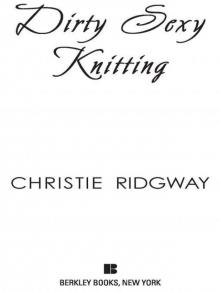 Dirty Sexy Knitting
Dirty Sexy Knitting Almost Wonderful
Almost Wonderful Beach House No. 9
Beach House No. 9 Wild Child (Rock Royalty #6)
Wild Child (Rock Royalty #6)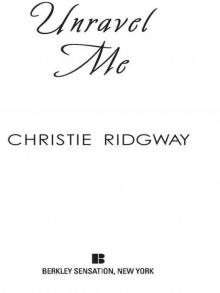 Unravel Me
Unravel Me Make Me Lose Control
Make Me Lose Control Me and Mr. Jones
Me and Mr. Jones Almost Always_Book 2
Almost Always_Book 2 Love Her Madly
Love Her Madly The Scandal (Billionaire's Beach Book 4)
The Scandal (Billionaire's Beach Book 4)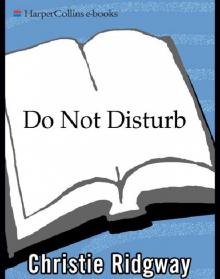 Do Not Disturb
Do Not Disturb Not Another New Year's
Not Another New Year's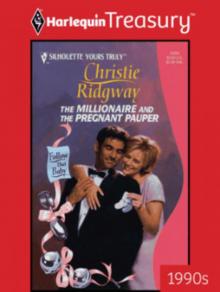 The Millionaire and the Pregnant Pauper
The Millionaire and the Pregnant Pauper The Secret (Billionaire's Beach Book 6)
The Secret (Billionaire's Beach Book 6) Beach House Beginnings
Beach House Beginnings RUNAWAY
RUNAWAY Take Me Forever (Billionaire's Beach Book 2)
Take Me Forever (Billionaire's Beach Book 2)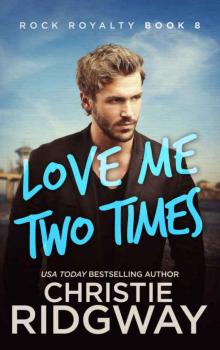 Love Me Two Times (Rock Royalty Book 8)
Love Me Two Times (Rock Royalty Book 8)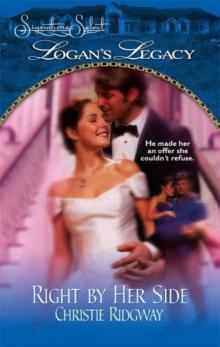 Right by Her Side
Right by Her Side Can't Fight This Feeling (Cabin Fever)
Can't Fight This Feeling (Cabin Fever)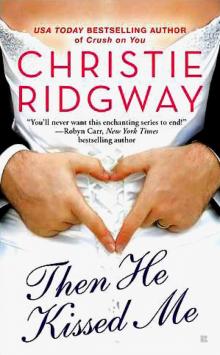 Then He Kissed Me
Then He Kissed Me Take My Breath Away
Take My Breath Away Knox KOBO
Knox KOBO I Still Do 02 - Runaway Bride Returns!
I Still Do 02 - Runaway Bride Returns!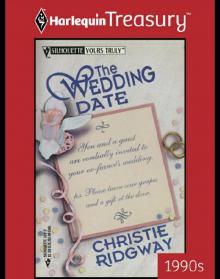 The Wedding Date
The Wedding Date THIS PERFECT KISS
THIS PERFECT KISS Me and Mr. Jones (Heartbreak Hotel Book 2)
Me and Mr. Jones (Heartbreak Hotel Book 2)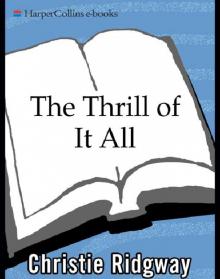 The Thrill of It All
The Thrill of It All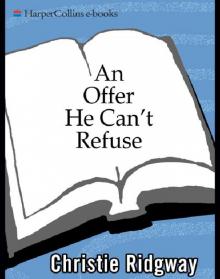 An Offer He Can't Refuse
An Offer He Can't Refuse The Love Shack
The Love Shack Runaway Bride Returns!
Runaway Bride Returns! Not Another New Year's (Holiday Duet Book 2)
Not Another New Year's (Holiday Duet Book 2) I Still Do
I Still Do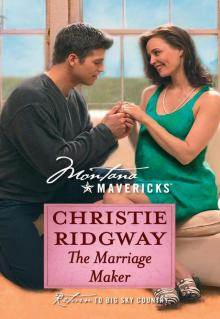 The Marriage Maker
The Marriage Maker